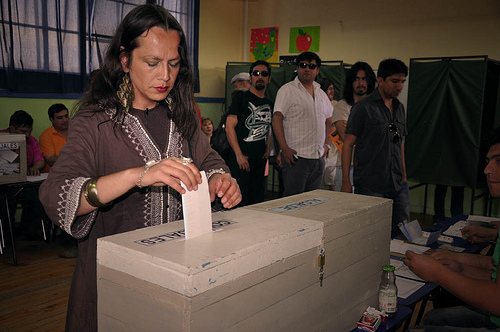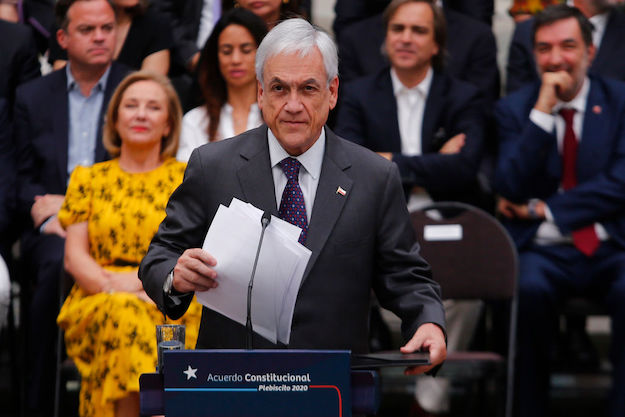The center-right ruling Alianza coalition led by President Sebastián Piñera suffered a setback in the municipal elections held on October 28. A year before the presidential election, prospects for the Alianza look grimmer. The Piñera administration—inaugurated two weeks after the devastating February 2010 earthquake—is now confronting the political aftershocks of his coalition’s losses and hoping to avoid the inevitable end next year of the first rightwing government in Chile since the restoration of democracy in 1990.
Turnout
There was plenty of uncertainty surrounding the recent election. A sweeping electoral reform increased the registered voting population from 8.4 million in 2009 to 13.5 million in 2012. The old system required people to register before they could vote. Though almost all eligible Chileans registered before the 1988 plebiscite, after democracy was restored, only a small percentage of those who turned 18 bother to register. Thus, though the eligible population increased, the registered population remained flat. After President Michelle Bachelet (2006–2010) championed a constitutional reform in 2009 to make voting voluntary, President Piñera complemented the change with a new reform that made registration automatic. All Chileans aged 18 or older—and all permanent residents who have lived in Chile for more than 5 years—are now automatically eligible to vote.
No one knew how many Chileans would vote. For one, there was no reason to believe that those who did not register before—a simple but time-inconvenient process—would vote now that they were automatically registered. For example, up to 800,000 people who reside abroad were registered even though votes can only be cast in Chile. A smaller number of former resident foreigners who have kept their residency status were also registered. Even some killed by the military dictatorship were automatically registered since many of the disappeared are legally “kidnapped” until their bodies are found (a way devised by human rights lawyers to bypass the amnesty law of 1978 that did not include kidnappings). The most telling evidence that the new electoral rolls overestimate the number of “actual” eligible people is that former President Salvador Allende—who died in the 1973 military coup—showed up as an eligible voter in the new registry.
Turnout disappointed everyone. Some 5.5 million Chileans showed up to vote, which is equivalent to 40 percent of those eligible. Even if turnout is adjusted to only include “real” eligible voters, it was still only 44 percent. Still, although turnout was the lowest in Chilean history, the percentage of voters who went to the polls is not uncommon in local elections in industrialized democracies. Further, since mayors in several municipalities were practically unchallenged, lower turnout was expected.
Ahead of the elections, several leftwing politicians warned that voluntary voting will further depress participation among the poor; but the old system already hindered registration among the poor. Others feared that moderate voters would stay away from the polls and the weight of polarized and highly ideological voters would increase. Another concern was that voluntary voting would give candidates the incentives to develop patronage schemes to organize get-out-the-vote campaigns.
Results
The ruling Alianza coalition suffered a big setback. In the first vote since Piñera was inaugurated in March 2012, the Alianza lost in several important municipalities in the Santiago metropolitan region. President Piñera’s low approval can be blamed for the Alianza’s defeat in open races. Low turnout also affected several Alianza mayors who unexpectedly lost.
The elections also showed that the Concertación has a much stronger electoral base. As a result, the Concertación surprisingly won in several municipalities with Alianza incumbents. In the end, the Alianza went from receiving 2.6 million votes in 2008 to securing less than 2 million in 2012. The Concertación’s totals decreased from 2.6 to 2.3 million.
Though each political force lost votes, a marked decline in enthusiasm for the Alianza meant that the number of municipalities with a Concertación mayor increased from 150 to 168. The Alianza lost 23 mayoral races, and now holds 121 municipalities. Though the number might not be too impressive, the fact the Concertación won in key races makes it politically relevant.
After 12 years of Alianza mayors, the Concertación won the mayorship in Santiago, the symbolically significant downtown municipality where government buildings are located. The Alianza also lost in Providencia, an upper-class municipality in the larger Santiago metropolitan area that was run for 16 years by a retired colonel who served under and was close to General Pinochet. The Concertación also won all but 3 of the 10 most important municipalities in the Santiago metropolitan region. Though the Alianza suffered fewer setbacks in the rest of the country, its losses in Santiago dominated news coverage.
In an interview after his victory in 2010, President Piñera confided that he knew after the Concertación victory in the 2004 municipal election meant that the Alianza had no chance in the next presidential contest. In January 2006, the Concertación’s Michelle Bachelet defeated Piñera in a runoff after the December 2005 first-round vote did not yield a clear winner. After the 2008 Alianza municipal election victory, Piñera knew he had the 2009 presidential election within reach. Going by Piñera’s rationale, the results of the 2012 municipal election do not offer the Alianza good prospects ahead of the November 2013 election.
The Concertación’s most likely candidate next year will be former President Michelle Bachelet. She remains highly popular. Though the Concertación parties are far less popular—and despite the presence of several Concertación presidential hopefuls that have asked for open primaries—Bachelet remains most likely to get the Concertación presidential nomination.
The ruling Alianza coalition will now need to regroup. President Piñera finds himself under increased pressure to shuffle his cabinet and let two popular ministers go to build their own presidential aspirations. Because the Alianza needs to regain ground and recover from the election, the sooner the government begins preparing for the uphill battle of the 2013 elections, the more options it will have to defy the dominant expectation today that the Concertación, under the leadership of Bachelet, will return to power in Chile.









